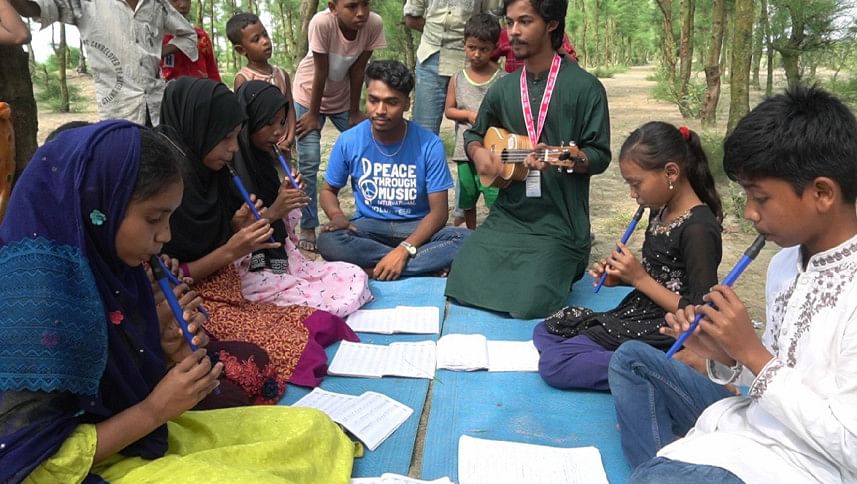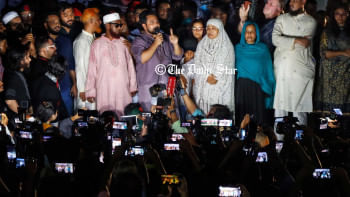Harmony in hard times

In the Najirartek area of Cox's Bazar, 14-year-old Riya Moni finds solace and happiness in the tunes of her penny whistle, a small flute-like instrument.
Whenever she feels down, she plays to lift her spirits, ease her worries, and bring her peace.
"Playing music makes me forget the difficulties of our tiny home," she said. Her talent has sparked admiration among her classmates, who ask where she learned to play and even express interest in learning themselves.
Her mother, Fatema Begum, feels both pride and joy watching Riya perform. "We lost everything and had to leave Kutubdia after a cyclone," Fatema recalls, explaining how her family settled in Najirartek in search of stability. "Our house is small, and life is tough, but when Riya plays, it feels like our sorrows disperse away."
Supporting Riya and children like her, a local NGO, Yasid, in partnership with Peace Through Music International (PTMI), runs a music programme for children in Najirartek, as well as for orphans in Cox's Bazar.
According to Pial Kanti Shil, the programme coordinator, this "peace through music" initiative aims to empower vulnerable and underprivileged children through music education.
In the heart of Najirartek, where nearly 10,000 climate refugees from Maheshkhali and Kutubdia have resettled over the past 34 years, the music school stands as a small haven.
Most of these families, who work as day labourers, fishermen, or rickshaw drivers, face daily struggles to make ends meet. For their children, the music school offers a rare escape.
During a recent visit, around 25 children, including 11-year-old Ashique, were seen immersed in learning musical techniques, scales, and rhythms.
"It feels incredible when I can play a tune on my flute," he said. Classes are held twice a week, and students often eagerly await their sessions, he added.
The programme's innovative approach also involves training local youth in instruments like the penny whistle and ukulele, who, once trained, become instructors for the children. This way, the children receive training on par with international standards, including how to read music notes and rhythms so they can play in harmony with others.
According to Shil, the programme has trained over 400 children and 100 volunteers in music.
The programme extended to the Rohingya refugee camps for a time, although that segment is currently paused, he added.

 For all latest news, follow The Daily Star's Google News channel.
For all latest news, follow The Daily Star's Google News channel. 



Comments